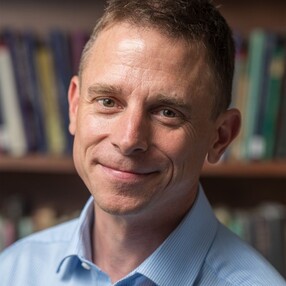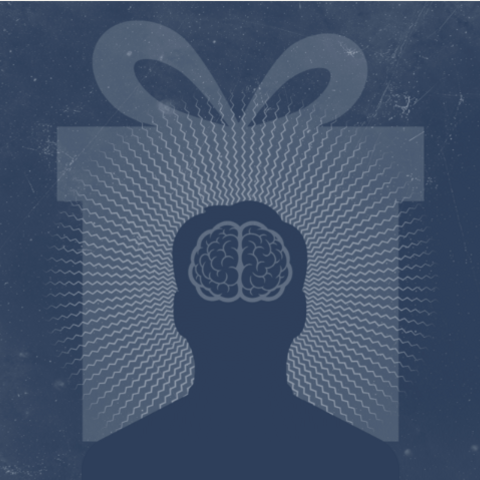Thinking to Be Wise
A political progressive makes the case for educational conservatism

Scott Newstok, PhD ’02, is a bit of contrarian. He urges his colleagues in higher education to integrate imitation, discipline, and constraint back into their pedagogy at a time when many decry these methods as outdated or even oppressive. At the same time, Newstok pushes back against schools’ reliance on standardized testing, calling for more freedom and autonomy in the classroom. Perhaps most audaciously, The Rhodes College professor’s new book endeavors to teach readers How to Think Like Shakespeare as students and faculty in the academy increasingly call for the “decolonization” of a curriculum traditionally dominated by white male voices.
Newstok, who is also director of the Pearce Shakespeare Endowment at Rhodes, spoke recently with GSAS about the book, the binaries he says are killing creativity, and about “Giving new validity to old form.”

GSAS: First of all, what’s with all the quotes? Your book is saturated with them.
Newstok: Just as humanist pedagogy encouraged “commonplacing,” my book grew from gathering favorite passages—not just from Shakespeare, but from a wide array of writers who’ve inspired me. I did this precisely because thinking like Shakespeare means thinking, in the poet Gwendolyn Brooks’ words, with “each other’s / harvest.” And I’m eager for this eclectic chorus of voices to be “the cause that wit is in others.”
So, the book itself seeks to emulate (and, I hope, model) one of that era’s key intellectual habits: archiving choice phrases for later reflection, and eventual action. By compiling the thoughts of others, we can become less, well, commonplace. As Bob Dylan insists, “quotation is a rich and enriching tradition;” ultimately, you have to “make it yours.”
(I’m refraining from quoting my dissertation director, [FAS Professor] Marjorie Garber—the authority on Shakespeare and quotation!)
GSAS: You write, “I stand with the contrarian view that to be a political progressive, one needs to be an educational conservative.” What do you mean by “political progressive” and “educational conservative” and why is the one dependent on the other?
Newstok: That’s a polemical statement, I know (and, as it happens, yet another quotation).
But I do find teachers too often presume that a certain kind of pedagogy necessarily aligns with a certain kind of political stance. As a result, longstanding, proven methods of learning—even something as fundamental as imitation—are maligned as somehow entailing an oppressive politics. A kind of homology is imagined, howsoever misguidedly. You can hear the sneer whenever someone scoffs at “the sage on the stage” or “the banking model of education” or “the outdated-19th-century-factory-model of schooling.” The implication: If you teach in this “backward” way, your politics must be “backward”; conversely, if you employ the latest jargon, you’re somehow undoing hegemony.
I’m keen to tease apart this conflation, and instead remind us that radically egalitarian goals can be achieved through what, at first glance, appear to be conventional practices—practices that we’ve conserved from the past, with good reason.
GSAS: You decry the No Child Left Behind Act, the loss of teacher autonomy, and exam culture. What are the educational binaries that are killing creativity? Is it really getting worse? What’s the evidence?
Newstok: Any parent whose children have been in school during the last decade knows that a high-stakes assessment regime has made things worse for education, not better. And I think any teacher who’s lived through the reforms of the last decade knows the same. My friends who are parents and my friends who are teachers uniformly concur, as do national surveys. To cite just one study: already by 2014, the National Council of Teachers of English estimated that its members were losing up to 110 hours of instructional time annually to testing and test-preparation—nearly a month out of every child’s year. And for what?
I’m painfully familiar with these studies, which confirm my own dismay. But look—my book’s largely taking as given this dismaying scenario. I’m trying to offer some inspiration to those caught within it: parents, teachers, and students alike.
We now act as if work precludes play; imitation impedes creativity; tradition stifles autonomy; constraint limits innovation; discipline somehow contradicts freedom; engagement with what is past and foreign occludes what is present and native. Shakespeare’s era delighted in exposing these purported dilemmas as false: play emerges through work; creativity through imitation; autonomy through tradition; innovation through constraints; freedom through discipline. Each of my 14 brief chapters weighs lessons from Shakespeare’s world (and work), chimes them with modern-day analogs, and suggests opportunities for further reading. Distilled here are the key ingredients of this manner of thinking—a kind of loose recipe for cooking it up.
I’m keen to…remind us that radically egalitarian goals can be achieved through what, on first glance, appear to be conventional practices—practices that we’ve conserved from the past, with good reason.
GSAS: You quote William Morris when you write that “the sixteenth-century exclusion of girls, the poor, and cultural minorities affronts our conviction that ‘truth must be common to all. We do not want art for a few, any more than education for a few, or freedom for a few.’” And yet many cultural minorities would say that the notions of truth and education embedded in this statement—and, for that matter, the notion of thinking like Shakespeare—are themselves extensions of a white, Protestant, Eurocentric worldview.
Newstok: To be fair, I’m also citing Mary Wollstonecraft there, and her insistence that basic Enlightenment ideals ought to extend to women just as much as they do to men—just as W. E. B. Du Bois would later insist that “I sit with Shakespeare and he winces not.”
Why would we want to exclude Shakespeare—or any writer— from any world? I love exploring his poetry with students from across the globe, whether American, Botswanan, Cambodian, Chinese, French, Japanese, Korean, Mexican, Thai, Vietnamese. And just as Shakespeare drew his sources from across the centuries and across global cultures, global cultures have read and revised his works for centuries since.
As former Harvard President Drew Faust pointed out, Achilles’ tutor sought to teach him “To be both a speaker of words and a doer of deeds.” The rhetorically intensive humanist curriculum was designed with just this end in mind. We learn from intellectual craftspeople how to hone past traditions to make them our own.
Martin Luther King, Jr. knew better than anyone that we make new things out of old:
Thinking critically means that the individual must think imaginatively, creatively, originally. Originality is a basic part of education. That does not mean that you think something altogether new; if that were the case Shakespeare wasn’t original, for Shakespeare depended on Plutarch and others for many of his plots. Originality does not mean thinking up something totally new in the universe, but it does mean giving new validity to old form.
“Giving new validity to old form…” that’s exactly the kind of Shakespearean spirit we all need right now. Education ought to exercise us in the crafts of freedom, helping us reach our fullest capacities to make by emulating aspirational models, stretching our thinking as well as our words.
Photo courtesy of Scott Newstok, Photo of Shakespeare window by State Library of Victoria, Melbourne: Crisco 1492 / CC BY-SA (https://creativecommons.org/licenses/by-sa/4.0)
Get the Latest Updates
Join Our Newsletter
Subscribe to Colloquy Podcast
Simplecast





